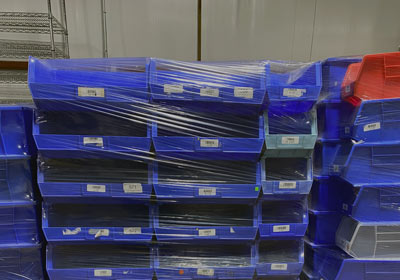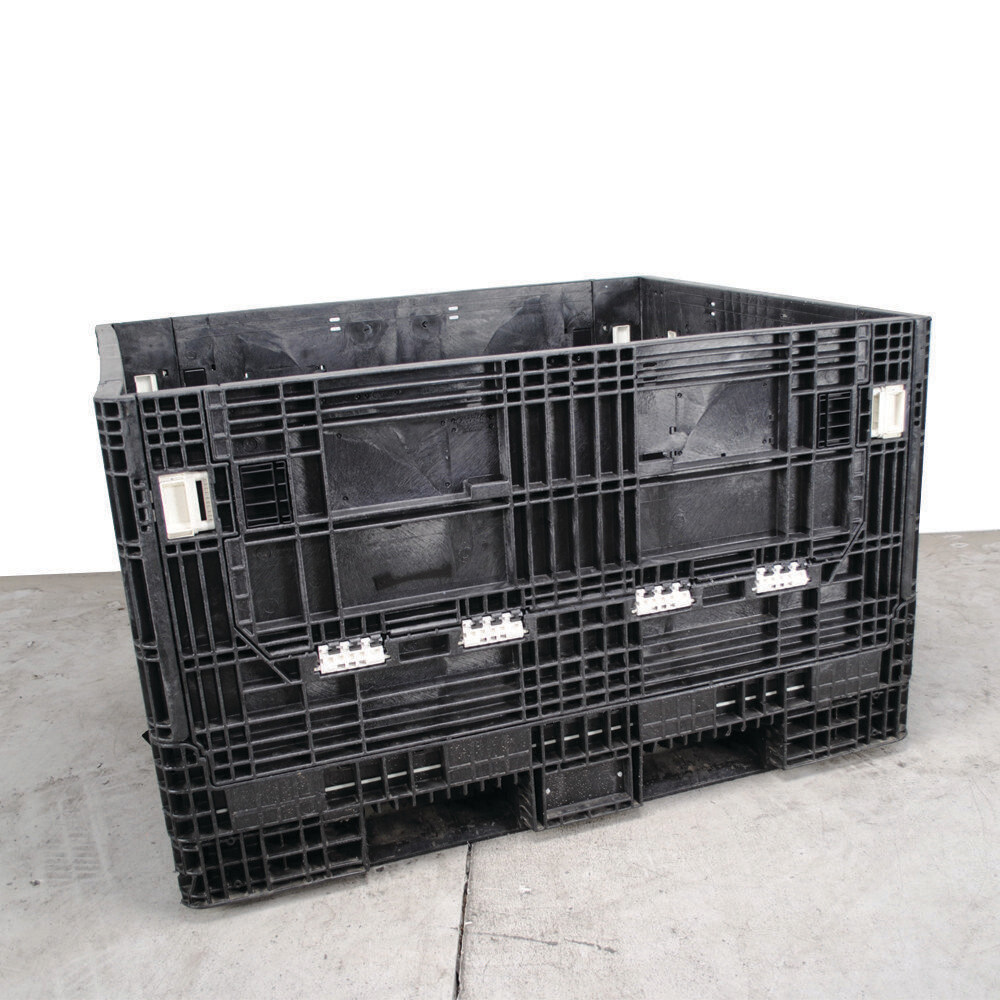The Ultimate Overview to Picking the Right Mass Containers for Your Organization Requirements
Selecting the ideal mass containers is vital for any type of company that relies upon effective logistics. Different kinds of containers exist, each designed for certain materials and applications. Variables such as dimension, material compatibility, and regulatory standards play a significant function in this decision-making procedure. Comprehending these components can bring about improved functional efficiency. Numerous services forget necessary aspects that can enhance their overall efficiency and sustainability. What are these factors to consider?
Understanding Different Kinds of Bulk Containers
Mass containers work as essential devices for businesses seeking efficient storage and transport options. These containers come in different types, each developed to satisfy details functional needs. One usual kind is the intermediate mass container (IBC), which is optimal for granulated and liquid materials, providing an equilibrium of capacity and ability to move. An additional prominent option is the bulk bag, or FIBC, appropriate for completely dry, flowable items. These flexible containers are lightweight and can be quickly carried and kept. For heavier products, rigid bulk containers are usually utilized, supplying durability and security for secure handling. Additionally, there are specialized containers customized for hazardous products, guaranteeing conformity with safety policies. Comprehending the unique characteristics of these bulk container types permits organizations to make enlightened choices that enhance logistics and decrease expenses. By selecting the appropriate container, business can enhance their operational performance and simplify their supply chain procedures.
Secret Product Factors To Consider for Mass Containers
When choosing mass containers, it is necessary to contemplate the products made use of in their building. Elements such as chemical, toughness, and stamina compatibility play an important function in guaranteeing the containers meet details operational requirements. Furthermore, weight and portability problems can affect both performance and transport logistics.
Material Longevity and Strength
Sturdiness and toughness are important aspects in choosing products for bulk containers, as they directly influence the container's ability to endure numerous environmental conditions and taking care of procedures. Materials such as high-density polyethylene (HDPE), polypropylene, and stainless steel are frequently favored for their durable buildings, offering resistance to abrasion, temperature, and effect fluctuations. The selection of material additionally affects the overall lifespan of the container; stronger products generally result in much less constant substitutes, resulting in cost savings over time. Additionally, the weight of the product can impact shipping prices and convenience of handling. Services need to consider their certain operational atmospheres and the possibility for wear and tear to ensure peak toughness and toughness in their mass container choice.
Chemical Compatibility Variables
Comprehending chemical compatibility is important for selecting bulk containers, as the products made use of must resist the specific materials they will certainly hold. Numerous variables affect compatibility, consisting of the chemical nature of the contents, temperature level, and duration of storage. Destructive chemicals may call for containers made from stainless steel or specialized plastics that stand up to degradation. Additionally, reactive compounds can generate warmth or gases, requiring aired vent or pressure-rated containers. The option of container material, whether polycarbonate, metal, or polyethylene, should straighten with the chemical residential or commercial properties of the kept substances to avoid violations or leaks. Ultimately, a complete examination of these compatibility factors assures risk-free handling and storage, securing both workers and the setting while maintaining product honesty.
Weight and Transportability Problems
Choosing mass containers entails not just reviewing chemical compatibility but also considering weight and transportability. Organizations should evaluate the convenience of handling and transport to enhance efficiency. Lightweight products like high-density polyethylene (HDPE) or aluminum can assist in easier motion and reduce shipping prices. Conversely, much heavier containers might provide improved longevity but can impede mobility, especially in settings requiring constant relocation. Additionally, the style of the container need to allow for convenient lifting and stacking, guaranteeing ergonomic safety and security for workers. Companies ought to likewise take into consideration the infrastructure available for transportation; for example, containers suitable with forklifts or pallet jacks can improve procedures. Ultimately, the best equilibrium in between weight and mobility directly influences operational effectiveness and price performance.
Sizing Your Mass Containers for Ideal Effectiveness
When sizing bulk containers, businesses should meticulously analyze the measurements called for to suit their details items. Additionally, weight ability is an essential variable that affects performance and safety during transportation and storage. Reliable sizing not only maximizes room however likewise enhances operational workflows.
Figuring Out Container Capacities
Selecting the best measurements for mass containers is crucial for optimizing effectiveness in storage and transportation. Businesses must analyze their details requirements, taking into consideration factors such as offered area, the nature of the items being kept, and the methods of transportation utilized. Precise measurements assure that containers fit ideally in storehouses and automobiles, minimizing wasted area and decreasing handling time. Standard sizes can provide convenience, but custom-made measurements could be required for unique demands or to suit specific products. Additionally, it is very important to assess piling capabilities and access, as these elements affect overall functional efficiency. Eventually, the best measurements bring about enhanced organization and streamlined logistics, profiting the overall efficiency of the business.
Weight Capacity Considerations
Recognizing weight capacity is crucial for services intending to optimize their bulk container performance. The weight capacity of a container straight impacts storage capacities, transport logistics, and general operational prices. Choosing containers with the proper weight limits ensures that organizations can safely store and move their products without risking damages or compliance issues. Straining containers can bring about structural failures, while underutilizing capability outcomes in wasted resources. It is essential for services to assess their product weights and think about any regulative demands when choosing containers. Additionally, elements such as the sort of product, planned usage, and ecological conditions should likewise influence weight capacity decisions. By evaluating these elements, companies can enhance efficiency and guarantee a streamlined supply chain.
Regulatory Conformity and Safety Requirements

Governing conformity and safety and security requirements play a necessary function in the choice of mass containers for services. Organizations should ensure that their containers satisfy numerous policies set by neighborhood, national, and global authorities. These criteria commonly refer to material security, structural integrity, and appropriate labeling, which assist stop mishaps and ensure the safe transportation of goods.
Furthermore, adherence to industry-specific guidelines, such as those from the Fda (FDA) or the Occupational Security and Wellness Administration (OSHA), is crucial for firms taking care of unsafe materials or food. Non-compliance can cause penalties, lawful concerns, or damages to a business's online reputation.
Organizations ought to additionally take into consideration the container's compatibility with the materials being kept or transferred to prevent contamination or chain reaction (refurbished bulk containers). To sum up, comprehending and implementing regulative conformity and safety standards is necessary for the effective and accountable use of mass containers
Sustainability Choices for Eco-Friendly Mass Containers

Firms are additionally checking out options made from recycled products, which not just save sources yet likewise sustain the recycling industry. Additionally, technologies in design permit for lighter containers that require less energy to transport, better improving sustainability. By incorporating these eco-friendly mass container choices, organizations can demonstrate their commitment to ecological stewardship while meeting consumer need for sustainable techniques. This change not just helps the world but can likewise boost brand name credibility and consumer commitment.
Cost-Effectiveness and Budgeting for Mass Containers
While several organizations concentrate on sustainability, cost-effectiveness continues to be a critical factor when selecting bulk containers. Organizations should analyze the first acquisition rate, along with long-lasting functional prices, to assure financial stability. Factors such as upkeep, reusability, and resilience play a significant role in establishing total expenditures.
Buying high-grade containers might produce higher ahead of time prices yet can cause financial savings via lowered replacement prices and reduced waste. In addition, organizations ought to take into consideration transport costs and storage space effectiveness, as these can affect the general spending plan.

Frequently Asked Inquiries
Just how Do I Identify the Right Container for Hazardous Materials?
To determine the right container for dangerous materials, one should review compatibility with the substance, consider the container's product, check for regulatory conformity, and examine capability and safety and security functions to ensure proper handling and storage space.
Can Bulk Containers Be Custom-made for Specific Products?
Yes, bulk containers can be personalized for specific products. used collapsible bulk containers. Different attributes, such as size, style, and material, can be customized to meet one-of-a-kind needs, guaranteeing perfect security and effectiveness for moving and saving different goods
What Is the Ordinary Life Expectancy of Different Mass Container Types?
The typical life-span of bulk container types differs; plastic containers last 5-10 years, metal containers 10-20 years, and site web wooden containers typically last 3-7 years, depending upon use, maintenance, and ecological conditions.
Exactly how Should I Clean and Maintain Mass Containers?
To cleanse and keep bulk containers, one should consistently evaluate for damages, eliminate deposit, laundry with suitable detergents, rinse extensively, and guarantee proper drying before storage space. Complying with producer standards boosts long life and safety and security during use.
Are There Rental Choices for Mass Containers Available?
Yes, many business supply rental alternatives for mass containers, providing flexibility for services. These services can fit numerous needs, allowing firms to manage stock effectively without the dedication of buying containers outright.
Resilience and strength are crucial aspects in choosing materials for bulk containers, as my response they directly affect the container's capability to hold up against various ecological conditions and managing procedures. Understanding chemical compatibility is essential for picking bulk containers, as the products used have to resist the particular substances they will certainly hold. Understanding weight ability is crucial for companies intending to optimize their mass container performance. Regulatory conformity and safety criteria play a vital role in the choice of mass containers for services. While lots of businesses focus on sustainability, cost-effectiveness remains an important element when selecting bulk containers.